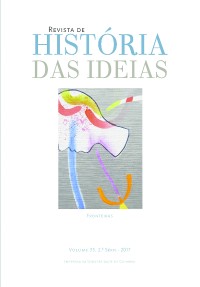Please use this identifier to cite or link to this item:
https://hdl.handle.net/10316.2/93127| Title: | Eça de Queirós e a questão judaica | Other Titles: | Eça de Queirós and the jewish question | Authors: | Coutinho, Paulo David dos Santos | Keywords: | Eça de Queirós;antisemitism;philosemitism;stereotype;preconception;Eça de Queirós;antissemitismo;filosemitismo;estereótipo;préconceito | Issue Date: | 2017 | Publisher: | Imprensa da Universidade de Coimbra | Abstract: | Diz a nota que anuncia este número da RHI que se fronteira é
um conceito com uma conotação habitualmente mais geográfica, ele
não será menos aplicável ao campo simbólico em que nascem, se
desenvolvem e circulam as ideias e os saberes. Efetivamente, se há
fronteiras que delimitam territórios, também há outras que moldam e
determinam mentalidades.
Com este texto sobre Eça, pretendemos vir ao encontro deste mote.
Em que medida, o facto de ter nascido num país mediterrânico, palco
privilegiado da atuação do Santo Ofício, e exercer funções consulares em
Newcastle – numa sociedade mais globalizada e tolerante que a alemã
da época –, em que medida estas circunstâncias influenciaram o discurso
e o pensamento de Eça em relação à Questão judaica e às perseguições
antissemitas ocorridas em 1880 na Alemanha?
Partindo da análise do pensamento da intelectualidade europeia desta
época; partindo de uma breve análise sociológica da situação dos judeus na Alemanha, avançámos para a análise do discurso de Eça, plasmado
sobretudo em dois artigos que escreveu em 1880 para a Gazeta de Noticias
do Rio de Janeiro.
Interessou-nos saber qual o posicionamento de Eça: antissemitismo
ou filosemitismo? Interessou-nos igualmente ver se o seu discurso
encerrava novidade ou era antes um repositório de estereótipos e
preconceitos. O resultado foi surpreendente, não obstante a ambiguidade
tão característica do autor… According to the note announcing this issue of the RHI that frontier is a concept with a more geographical connotation, it will no less apply to the symbolic field in which ideas and knowledge are born, developed and circulated. Effectively, if there are boundaries that delimit territories, there are also others that shape and determine mentalities. With this text on Eça, we intend to meet this motto. To what extent was the fact that he was born in a Mediterranean country, a privileged venue for the Holy Office, and to perform consular functions in Newcastle – in a more globalized and tolerant society than the German one at the time – to what extent these circumstances influenced discourse and The thought of Eça in relation to the Jewish Question and to the anti-Semitic persecutions that occurred in 1880 in Germany? Starting from the analysis of the thinking of the European intelligentsia of this time; Starting from a brief sociological analysis of the situation of the Jews in Germany, we proceeded to the analysis of the discourse of Eça, shaped mainly in two articles that wrote in 1880 for the Gazeta de Noticias of Rio de Janeiro. It interested us to know what the position of Eça: anti-Semitism or phylosemitism? We were also interested to see if his speech contained novelty or was rather a repository of stereotypes and prejudices. The result was surprising, despite the ambiguity so characteristic of the author ... |
URI: | https://hdl.handle.net/10316.2/43313 | ISSN: | 0870-0958 2183-8925 (PDF) |
DOI: | 10.14195/2183-8925_35_14 | Rights: | open access |
| Appears in Collections: | Revista de História das Ideias |
Files in This Item:
| File | Description | Size | Format | |
|---|---|---|---|---|
| ec_a_de_queiro_s_e_a_questa_o_judaica.pdf | 637.91 kB | Adobe PDF |  |
Items in DSpace are protected by copyright, with all rights reserved, unless otherwise indicated.
